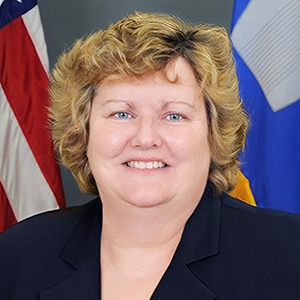AI Gov: Mastering Data
With the advent of newfound cloud computing architecture and information processing capacities, federal agencies have begun to explore the usage of AI for advanced data analytics and insights. Hear from technologists across the federal government on how their organizations are using artificial intelligence and complex analytics to further their mission and lead the next stage of IT modernization.

Speakers / Panelists
-
 Amy Kluber Editorial Director GovCIO Media & Research
Amy Kluber Editorial Director GovCIO Media & Research
Federal agencies are increasingly looking towards artificial intelligence and complex data analytics to power the next phase of their modernization programs. During this fireside chat, hear how evolving work in data management is being used to further build out on critical services and refine the focus of agency missions.
Speakers / Panelists
-
 Eileen Vidrine Chief Data Officer U.S. Air Force
Eileen Vidrine Chief Data Officer U.S. Air Force -
 Moderator Kate Macri Staff Writer/Researcher GovCIO Media & Research
Moderator Kate Macri Staff Writer/Researcher GovCIO Media & Research
Newfound AI capacities have allowed federal agencies to leverage proprietary data towards predictive modeling, allowing them to more effectively deliver services and act upon their core mission. Hear from AI specialists on how their agencies are leveraging data to create models that further essential research and analysis.
Speakers / Panelists
-
 Qi Duan Program Director Division of Health Informatics Technologies (DHIT) NIBIB
Qi Duan Program Director Division of Health Informatics Technologies (DHIT) NIBIB -
 Rafael Fricks Lead AI Tech Sprints Coordinator VA
Rafael Fricks Lead AI Tech Sprints Coordinator VA -
 Dr. Amy Justice CNH Long Professor of Medicine and of Public Health, Yale University; Staff Physician VA Connecticut Healthcare System
Dr. Amy Justice CNH Long Professor of Medicine and of Public Health, Yale University; Staff Physician VA Connecticut Healthcare System -
 David Womble AI Program Director, Oak Ridge National Lab DOE
David Womble AI Program Director, Oak Ridge National Lab DOE -
 Moderator Adam Patterson Staff Writer/Researcher GovCIO Media & Research
Moderator Adam Patterson Staff Writer/Researcher GovCIO Media & Research
With today’s cybersecurity landscape becoming increasingly complex, artificial intelligence is being employed to ensure sensitive data is protected across government. Hear how federal agencies are leveraging AI to counter and protect against evolving cyber threats.
Speakers / Panelists
-
 Oki Mek Chief AI Officer HHS
Oki Mek Chief AI Officer HHS -
 Moderator Joe Cormier Chief Operating Officer GovCIO
Moderator Joe Cormier Chief Operating Officer GovCIO
Speakers / Panelists
-
 Amy Kluber Editorial Director GovCIO Media & Research
Amy Kluber Editorial Director GovCIO Media & Research
-
 Qi Duan Program Director Division of Health Informatics Technologies (DHIT), NIBIB
Qi Duan Program Director Division of Health Informatics Technologies (DHIT), NIBIB -
 Dr. Amy Justice CNH Long Professor of Medicine and of Public Health, Yale University; Staff Physician, VA Connecticut Healthcare System
Dr. Amy Justice CNH Long Professor of Medicine and of Public Health, Yale University; Staff Physician, VA Connecticut Healthcare System -
 Oki Mek Chief Artificial Intelligence Officer, HHS
Oki Mek Chief Artificial Intelligence Officer, HHS -
 Eileen Vidrine Chief Data Officer, U.S. Air Force
Eileen Vidrine Chief Data Officer, U.S. Air Force -
 David Womble , DOE Rafael Fricks Rafael Fricks Lead AI Tech Sprints Coordinator, VA
David Womble , DOE Rafael Fricks Rafael Fricks Lead AI Tech Sprints Coordinator, VA -
 Rafael Fricks Lead AI Tech Sprints Coordinator, VA
Rafael Fricks Lead AI Tech Sprints Coordinator, VA


